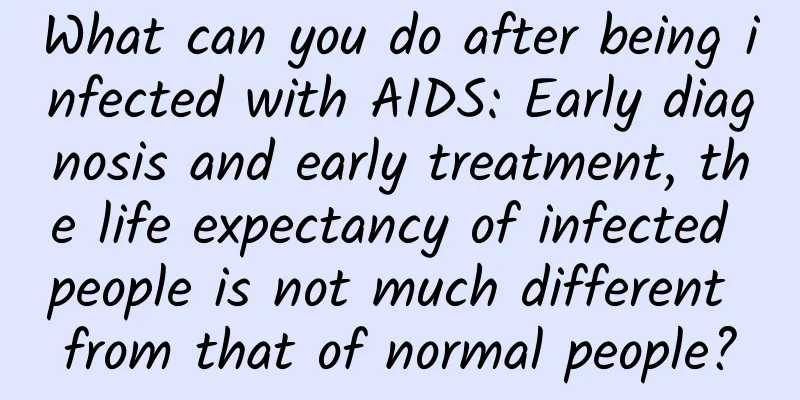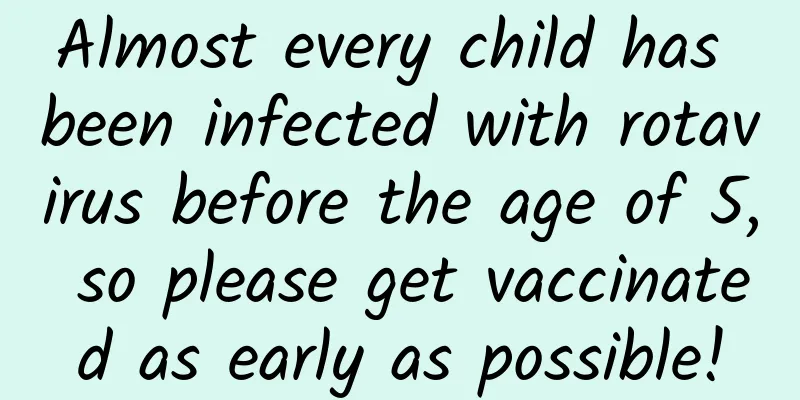What can you do after being infected with AIDS: Early diagnosis and early treatment, the life expectancy of infected people is not much different from that of normal people?

|
1 Clinically, HIV infection is divided into three stages: acute stage, asymptomatic stage and AIDS stage, and the symptoms of these three stages are also different. In the acute stage of HIV infection, patients may have flu-like symptoms, but they are not specific, while those infected in the asymptomatic stage usually have no obvious abnormalities. 2 Epidemiological history is very important for determining whether you will be infected with HIV. If you do not have a special epidemiological history such as unsafe sexual contact, unclean blood transfusion history, intravenous drug use history, or contact with blood or contaminated body fluids from mucous membranes or wounds of HIV-infected people, you do not need to worry about HIV infection. 3 High-risk groups should be tested, discovered and treated early to achieve good treatment results, prolong life and reduce transmission. Infected people undergoing antiviral treatment should follow the doctor's advice, take medicine and have follow-up examinations on time to reduce the chance of drug resistance and ensure quality of life. Although there are many popular science articles about AIDS, there are still netizens asking questions: If I have XXX symptoms, am I infected with AIDS? What can I do if I have AIDS? Today, we invited Dr. Zhao Hongxin, Director of the First Infection Department of Beijing Ditan Hospital, to share relevant knowledge with you. 1. What symptoms indicate HIV infection? AIDS, the full name of which is "Acquired Immune Deficiency Syndrome", is a chronic infectious disease caused by the human immunodeficiency virus (HIV). It is characterized by HIV's specific attack on CD4+T lymphocytes, which damages the human immune system and leads to various opportunistic infections and related tumors. Clinically, HIV infection is divided into three stages: acute phase, asymptomatic phase and AIDS phase. The symptoms of these three stages are also different. 1. Acute phase It usually occurs 2 to 4 weeks after the initial infection with HIV. Most patients have mild clinical symptoms, which last for 1 to 3 weeks before being relieved. Fever is the most common clinical manifestation, which may be accompanied by neurological symptoms such as sore throat, night sweats, nausea, vomiting, diarrhea, rash, joint pain, swollen lymph nodes and headache. The acute phase manifestations are similar to those of other viral infections and are easily overlooked. 2. Asymptomatic period This stage may be entered from the acute phase, or directly without obvious acute phase symptoms. This phase generally lasts for 6 to 8 years, and some patients may progress rapidly. The duration is related to factors such as the number and type of infected viruses, the route of infection, individual differences in the body's immune status, nutritional conditions, and living habits. During the asymptomatic period, as HIV continues to replicate in the infected person's body, the immune system is damaged and the CD4+T lymphocyte count gradually decreases. Symptoms or signs such as swollen lymph nodes may occur, or there may be no obvious symptoms, which are generally not easy to attract attention. 3. AIDS stage This is the final stage after HIV infection. The patient's CD4+T lymphocyte count is usually less than 200/μl, and the HIV plasma viral load is significantly increased. The main clinical manifestations of this stage are HIV-related symptoms, signs, and various opportunistic infections and tumors. Different opportunistic infections or tumors have different clinical manifestations. The more common symptoms and complications include: (1) Unexplained persistent irregular fever: above 38°C for more than 1 month; (2) Diarrhea (more than 3 bowel movements per day) for more than 1 month; (3) Weight loss of more than 10% within 6 months; (4) Recurrent oral fungal infections (oral leukoplakia); (5) Recurrent herpes simplex virus infection or herpes zoster virus infection; (6) Pneumocystis pneumonia: fever, dry cough, progressive dyspnea; (7) Tuberculosis or non-tuberculous mycobacterial disease: fever, night sweats, cough and sputum, hemoptysis, lymphadenopathy, abdominal mass, weight loss, etc.; (8) Cytomegalovirus (CMV) infection: floaters, floating objects, blind spots or peripheral visual field defects, rapid visual loss or even blindness, fever, cough, dyspnea, dysphagia or dysphagia, diarrhea (watery stool or bloody stool), accompanied by abdominal pain. Mucosal ulcers can be seen under gastroscopy or colonoscopy. (9) Various intracranial infections, intracranial tumors and AIDS-related encephalopathy: headache, fever, vomiting, convulsions, limb movement disorders, neuropsychiatric changes, drowsiness, mental confusion, confusion, dullness, aphasia, visual impairment, weakness, epileptic seizures, facial paralysis, urinary retention, etc. (10) Kaposi sarcoma: purple-red nodules on the skin and mucous membranes, and enlarged lymph nodes. 2. Common misconceptions about AIDS 1. Will people with AIDS die soon? The truth: With early diagnosis and early antiviral treatment, the life expectancy of HIV-infected people is not much different from that of normal people. AIDS refers to all stages of HIV infection. In fact, during the acute and asymptomatic stages of HIV infection, the patient's immune function has not been greatly damaged. If diagnosed early and treated promptly, the life expectancy of HIV-infected people is not much different from that of normal people. However, it should be noted that the symptoms in these two stages are mild and easy to be ignored, which can easily lead to the spread of the virus. 2. Does fever, rash, and swollen lymph nodes mean that you have AIDS? The truth: Many viral infections may cause these symptoms, and the epidemiological history is very important in determining whether you are infected with HIV. The fact is that many viral infections may cause the above symptoms. Epidemiological history is very important for determining whether you will be infected with HIV. If you do not have an epidemiological history of unsafe contact, unclean blood transfusion, intravenous drug use, or contact with blood or other toxic body fluids from mucous membranes or wounds of HIV-infected people, you do not need to worry about HIV infection. 3. You cannot have any daily interactions or contact with HIV-infected people or AIDS patients, otherwise you will be infected with HIV? The truth: You will not be infected with HIV through daily interactions such as shaking hands, hugging, polite kissing, eating together, and working together. HIV is only transmitted through blood or some special toxic body fluids, and the transmission routes are sexual transmission, blood transmission, and mother-to-child transmission. You will not be infected with HIV through daily interactions such as shaking hands, hugging, polite kissing, eating together, working together, etc. You will not be infected with HIV through mosquito bites. 4. If you look healthy, does that mean you are not infected with HIV? The truth: Looking healthy does not mean you are not infected. If you have the epidemiological history mentioned above, you should be tested as soon as possible. During the acute and asymptomatic stages of HIV infection, the infected person often looks no different from an ordinary person. However, if you have the epidemiological history mentioned above, you should get tested as soon as possible. A healthy appearance does not mean you are not infected. 5. Can HIV-infected families not have more babies? The truth: As long as the antiviral treatment of the parents is effective and supplemented with other measures, they can give birth to healthy babies. The fact is that many families of HIV-infected people have healthy babies. As long as the positive father or mother has good antiviral treatment, supplemented by pre-exposure prophylaxis and mother-to-child transmission prevention measures, healthy babies can be born. 6. After a period of antiviral treatment, if the virus can no longer be detected, can the antiviral drugs be stopped? The truth: The virus is only suppressed by the drug, not eliminated. The fact is that current antiviral treatment is lifelong treatment. Although the virus can no longer be detected, it still lurks in various parts of the body and is suppressed by drugs, but has not been completely eliminated. Once the drug is stopped, the virus will soon come back. 3. What are the effective or expected treatments? Since the first case of AIDS was reported in the United States in 1981, scientists have made remarkable achievements in AIDS research, from the birth of cocktail therapy in 1996, to the emergence of the "Berlin patient" and "London patient" who were called "cured", to the development of broad-spectrum neutralizing antibodies against HIV, constantly bringing new directions and hopes to the treatment of AIDS. 1. Antiretroviral therapy It is currently the most effective method for treating HIV infection. HIV antiviral treatment in my country began at the end of 1999, and its widespread clinical use began in 2003, mainly due to the implementation of free treatment by the state. At present, drugs for treating HIV are relatively mature, and infected people have more and more drug options. The effect of antiviral treatment is very good. More and more drugs with small side effects and easy to take are used in clinical practice. The price is not very expensive, and medical insurance can also be used. Compared with 20 years ago, as long as patients actively receive treatment, their lives can be greatly extended and their quality of life has been greatly improved. 2. HIV vaccine A safe and effective vaccine is one of the important means to prevent HIV infection and control the spread of HIV, and it is also the biggest challenge in the field of AIDS research. However, HIV vaccine research has been under development for more than 30 years, but due to the rapid mutation of HIV genes, short survival time in vitro, and high cost of vaccine development, HIV vaccine research has not made any breakthrough progress. But it is certain that HIV vaccine will still be the ultimate breakthrough in AIDS prevention and treatment research. 3. CCR5Δ32/Δ32 allogeneic bone marrow hematopoietic stem cell transplantation The world's first "cured" "Berlin patient" reported by NEJM in 2009 and the "London patient" reported by Nature in 2019 have brought new hope and direction to AIDS treatment. However, this requires finding a bone marrow donor with a homozygous CCR5Δ32 gene mutation (a mutation with a very low probability in the population) and matching the matching type. The probability of the superposition of these two factors is very low, and the cost is high, making it difficult to replicate clinically. However, this method provides a new idea for the treatment of AIDS. Other advances, such as broad-spectrum neutralizing antibodies against HIV and CAR-T, are still immature and cannot be used in clinical practice, but they have great prospects. Finally, there are two things to note: 1. High-risk groups should be tested, discovered and treated early to achieve good treatment results, prolong life and reduce transmission. 2. Infected people undergoing antiviral treatment should follow the doctor's instructions, take medication and have follow-up examinations on time to reduce the chance of drug resistance and detect side effects as early as possible. |
Recommend
Is it possible to have children with central amenorrhea?
Amenorrhea is a comprehensive symptom in women. T...
What are the precautions in late pregnancy?
The late pregnancy is very close to the day of de...
What is suitable to eat for uterine cold?
The biggest threat to women is infertility. After...
What are the symptoms after a girl's first time?
Female friends will feel slight pain in the vagin...
Uric acid is broken during menstruation
Women are very vulnerable during their menstrual ...
Obesity is not caused by eating too much? Losing weight comes down to these 3 ways
After trying to lose weight many times, many peop...
Female body organ distribution map_Human body organ distribution map female_Human body organ distribution map female_Human body female organ distribution map
The five internal organs of the human body are im...
Is it pregnancy when the belly hurts?
During the pregnancy preparation period, pain in ...
Symptoms of spontaneous abortion Abdominal pain
Some women do not want the baby when they have an...
Normal belly picture of 100 days of pregnancy
Pregnancy can be divided into three stages. The p...
Dandelion compress for breast hyperplasia
Dandelion is a very inconspicuous plant. When we ...
Can Candida albicans be passed on to children?
Candida is a disease caused by fungal infection. ...
Nuts are a popular New Year's gift! Will eating them make you fat or thin? Decoding 6 rumors about nuts
Author: Xue Qingxin, registered dietitian Reviewe...
One month after abortion, there is blood in the vaginal discharge
Although abortion is very harmful to women's ...
The most accurate symptoms of early pregnancy boy
After pregnancy, pregnant mothers are more curiou...






![[North Xinjiang science experts say: Not that safe] "Vitamin B complex supplements: How to strike a balance between blindly following the trend and scientific supplementation?"](/upload/images/67f15dec07f63.webp)


